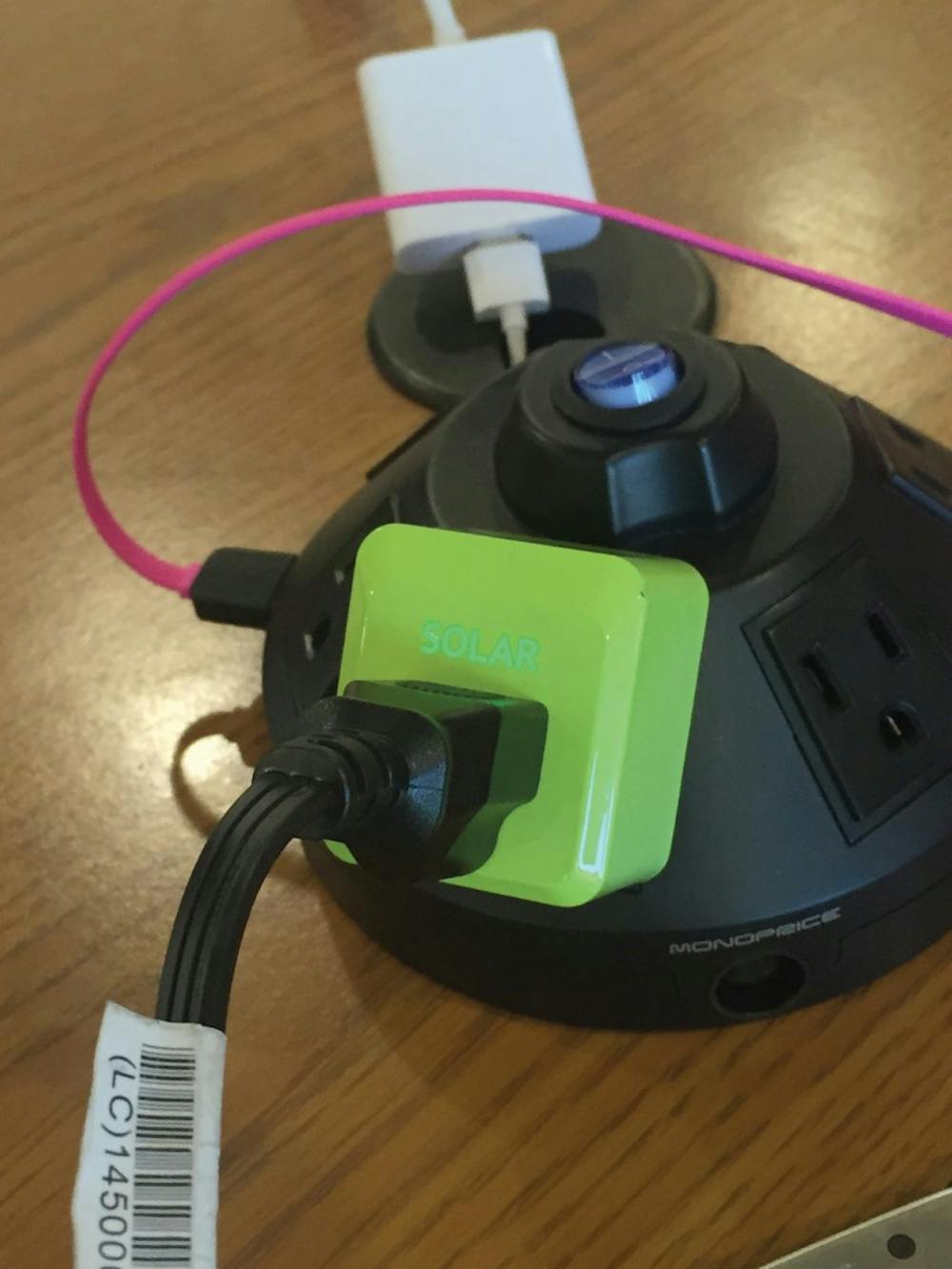According to the U.S. Energy Information Administration, 85 percent of all electricity in the United States in 2014 was generated via coal, natural gas and nuclear plants. Solar gets hardly any love among the seven percent that comes from renewable energy resources: in 2014, only 0.4 percent of our power came from the sun.
The SunPort, a product made by an Albuquerque startup team, is looking to change that on a global scale. With the ease of just plugging it into an outlet, a consumer can begin using solar.
“For the last 20 or so years, in theory, you could do this, but you didn’t have a device,” said Paul Droege, creator and visionary of SunPort. “It’s always been there, but nobody’s really taken advantage of it, and that’s what’s interesting about this: In a way, it wasn’t so much an invention as a repurposing.”
Thanks to a recent Kickstarter campaign, Droege said “repurposing” has consumers excited for his product, a small cube that essentially borrows solar energy from those with solar panels for only a few cents more per day.
The global consumer marketplace is already buzzing about it, said Julia Jones, director of digital marketing at SunPort.
“It’s the people, nobody else but the people, that are creating this demand,” Jones said.
That was made evident by its Kickstarter campaign that began on July 28 with a goal of raising $75,000 by August 27. It reached that mark a week ahead of schedule, thanks to 1,676 backers, and by the end of its campaign it raised almost $121,000.
“Our thought was that we would have at least a thousand backers if we got to $75,000,” Droege said. “It was a solid validation, but also the visibility it created: this wasn’t a thing that we barely dragged over the finish line. This was totally the crowd that got us there. There’s real interest.”
Droege said current priorities for his team include improving the SunPort app, safety certification and, hopefully, lining up investors.
Barring any hiccups in the process, he said he hopes to begin introducing the SunPort to the world next March.
Bruce Milne, director of UNM’s Sustainability Studies program, said that a widespread SunPort consumer base could affect the direction of the energy industry.
“I think it takes a shift away from the scarcity mentality that we don’t have enough energy, we can’t get enough power from the wind or sun, it will cost too much, etc., to the abundance mentality,” Milne said. “We are smart enough to reinvent the grid so that energy flows as much as we need.”
Get content from The Daily Lobo delivered to your inbox
That isn’t the only incentive to using SunPort, however.
“We want you to feel good using it, we want you to feel like you are contributing to something greater,” Jones said. “What’s going to make people connect and care?”
Jones and the rest of the SunPort team are hoping that what will trigger people will be the fact that not only are consumers guiltlessly using electricity for the first time, but they’re helping their communities through local nonprofits as well.
“I think that that’s when it’s going to hit people: when it’s in their city,” she said.
One nonprofit that SunPort has just recently begun collaborating with is Mandy’s Farm – a residential center for young women with autism and other disabilities, according to their website.
Most nonprofits already operate on tight budgets, and the fact that they are tax-exempt steers them away from expensive solar systems. This is why SunPort is installing a system for Mandy’s Farm at their location – to be paid for by the same people using solar energy through the SunPort.
“We’re able to provide this system to them at no cost based on users of our platform,” said Jonathan Droege, executive director of reChoice, the arm of the business that reaches out to the nonprofits for collaboration. “Solar is not just a cleaner kind of energy, it’s really a kinder energy.”
SunPort isn’t a traditional product, and because of that Jones said a particular population has embraced the concept wholeheartedly.
“Reaching out to the younger generation is going to be a really important piece of the puzzle here,” she said. “All of us had so many conversations with the middle-school age group, and it’s so much easier to explain it to them than to an adult. With adults you almost have to re-teach them; when you explain it to kids, they’re like, ‘Wow, that’s cool, I’m accessing solar energy with this.’ and they totally get it.”
Paul Droege said that mindset is driving the SunPort forward, and will be key to making the SunPort accessible to everyone, even college students.
“The beauty of this is you don’t have to be the one paying the power bill,” Paul Droege said. “You can plug it into the dorm room, a coffee shop, the SUB, and you’re demanding solar. That’s part of the vision that we all share. The little cube is nice, and I wouldn’t try to minimize it, but in reality what’s more important is the platform behind it, and the concept that it’s built on.”
David Lynch is the news editor at the Daily Lobo. He can be reached at news@dailylobo.com or on Twitter @RealDavidLynch.






